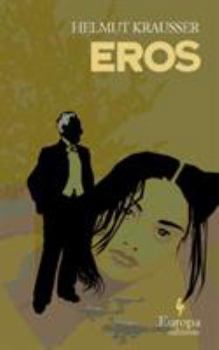Eros
A reclusive millionaire with an enigmatic past invites an unnamed writer to stay with him and ghostwrite his autobiography. But the story he recounts turns out to be a dazzling fabrication - the fruit of madness and obsession. With Eros, Helmut Krausser takes the age-old motif of love unrequited until death a step further: this is a novel that already reads like a classic.' - Playboy'
Format:Paperback
Language:English
ISBN:1933372583
ISBN13:9781933372587
Release Date:November 2007
Publisher:Europa Editions
Length:340 Pages
Weight:0.80 lbs.
Dimensions:1.0" x 6.4" x 8.2"
Age Range:18 years and up
Grade Range:Grade 12 and higher
Customer Reviews
2 ratings
"Works of art were lies, he said....only fragments retained an option on the truth."
Published by Thriftbooks.com User , 15 years ago
Since two reviews (including a very complete one with plot summary and convincing interpretations of symbolism), have already been posted here, I will just add a few additional observations.... Eros blurs the lines between truth and lie, life and art, love and obsession. Examples: -- The reliability of its original storyteller, industrialist Alexander von Bruecken is in question, and the unnamed novelist to whom von Bruecken relates his tale in eight days could be merely a fictional character author Helmut Krausser has conjured, or...not. In this EROS hall of mirrors, Krausser can't be ruled out as a man telling a veiled story he really heard from a tycoon. -- Sofie Kurtz, the working class woman who is the object of von Bruecken's lifelong fixation undergoes identity changes, first when she is adopted by a friend's parents and later when her criminal activities in West German Marxist groups force her to accept a new name and a restrictive life in the German Democratic Republic. Alexander, in his intermittent, infrequent contacts with Sofie also dons various "disguises." First, he botches their initial adult reunion with her by hiding his real self behind a crass display of opulence. Later, he passes himself off as a man of her class. He, like the East German Stasi, also uses agents to covertly spy on (he would say watch over) her, and to shape aspects of her life. These interventions by power -- state and magnate -- herd Sofie to a degree, but she retains her desire for self-determination. -- Then there is von Bruecken's trusty private secretary, Lukian Keferloher, who keeps deflecting the curious novelist back to von Bruecken, despite heavy hints that he (Keferloher) may have played a very important but unheralded part in the Sofie saga. It is he who says that works of art are lies and that "perhaps it would be best if the story were to stay a fragment" because "only fragments [retain] an option on the truth." Keferloher serves as the recondite intermediary (perhaps "glue") between power and proletariat. He chooses to serve without being fully known to anyone. -- Von Bruecken wants to be known, but as a work of art. He wants the novelist to "create" him and the others in his story as fictional representations; this is why von Bruecken selected him instead of some noted biographer. -- The novelist inside EROS responds with a book in which "I have reproduced almost everything he recorded on tape for me verbatim. I felt the way he DIDN'T describe some things, or refused to describe them, said more than any invention, however much embellished, could have done." The novelist desires to become the biographer (or recorder) after all, but still, of course, produces an ambiguous, incomplete portrait. Moving to another subject: the averred symbolism (refer to other review) in which Alexander embodies "Germany's post WWII economic miracle" and Sofie "the dissatisfied youth" can also be interpreted slightly differently, namely as the old stand-
A great book
Published by Thriftbooks.com User , 15 years ago
The description of the Allies bombardment of Munich and the suffering of soldiers in the war is brief but graphic. The bombardment was "phosphorus, fire and terror" The fourten year old protagonist, Alexander, hospitalized for chicekenpox along with wounded soldiers says,"everybody had a hard-on when towelled down by sister Agnes except Lt. Krollmann as his equipment had been shot away"! There is also the crowded refuge in the air-raid shelter at night where Alex's love for Sofie sprouts.This love, growing as Alex ages, has something of Werther's in it. Who has said, "It is the ideal of yearning-the lover who can never be possessed". Is it Erica Jong? But Sofie's rejection of Alexander cannot be understood. She says that she doen't love him. But sticks with Henry ten years younger but sexually like "a storm on exposed countryside".And despite his violence towards her. One could conclude that Sofie's rejection of Alex was because of her class cnsciosness- the poor putting the rich in his place. There is considerable voyeurism by imagination on the part of Alexander. The demonstartion of the youth in GDR against the police as being repressive should be contrasted with the highly restricted life Sofie is allowed to lead in the FDR after she is smuggled there by the STASI. Sofie comes comes off as intellectually wobbly. She gets more deeply involed with Marxism despite comprehending that "just socialism without oppression" will not work. Lukian- sketched a bit shadowly- comes off as a loyal friend, a devoted lover, a noble character, in short. The discussion between Alex, incognito, and Sofie about Seneca and Nero, the power of the majority in a democracy and where truth lies are all intersting. A great read






